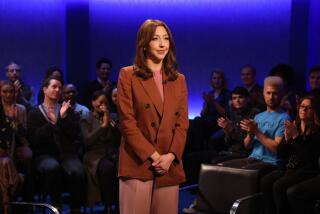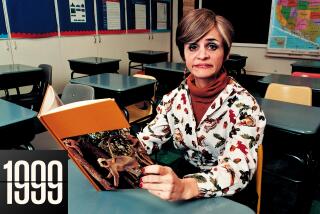Bill Hader, Kristen Bell and other comedy stars on unlikable characters and the rise of nostalgia
Editor’s note: This interview took place before Roseanne Barr’s racist tweet caused ABC to cancel “Roseanne” on Tuesday.
In tumultuous times such as these, comedy is more essential than ever. It offers some common ground, some (mostly) safe space and, best of all, a good time. “Everybody is dying for a little bit of comic relief,” says Eric McCormack whose “Will & Grace” recently relaunched after 10 years away. McCormack was one of six comedic actors from shows both new and familiar to join the Envelope for a free-flowing conversation that at one point threatened to make a left-turn into an intervention for “Glow’s” Marc Maron.
Along with McCormack (whose “Will & Grace” regathers its original cast) and Maron (whose series is about the launch of women’s wrestling and the cocaine-sniffing director behind it), were Kristen Bell (“The Good Place,” an examination of morality set in the afterlife), Bill Hader (“Barry,” a hitman who wants to be an actor), Sara Gilbert (“Roseanne,” the family we know and love some 20 years later) and Justina Machado (“One Day at a Time,” a family similar to the one we know and love some 30 years later). Between the giggles, the group touched on such topics as diversity, nostalgia, bad dye jobs and the Fonz.
Here are excerpts from that conversation, edited for length and clarity.
The characters that most of you play, how do I say this, they’re not warm, fuzzy and likable.
Sara Gilbert: How dare you?
Eric McCormack: I like to think of myself as fuzzy.
For instance, there’s a self-centeredness to Will, to Eleanor. You are—
Bill Hader: I murder people, so I think I take the cake pretty much in unlikable.
McCormack: But I think that actually speaks to the sophistication of the audience that’s grown over the years. There was a time when a network executive would say, “They’re not likable enough! We have to love them!”
Hader: Yeah, actually it’s the opposite now, we went in to pitch the show [to HBO], and it was like, “I’m gonna be a hit man who wants to be an actor, but it’s going to be very grounded; the violence is very real.” And they were the ones that said, “Oh, and he takes an acting class so that he can get in touch with his emotions.” And we were like, “Yes. You’re right! That’s what we thought.” Like they’re telling you, “We don’t want a thing that’s safe,” because there’s so much of it now.
Gilbert: I said this when I was a kid — it might speak to my character in a bad way — but I said, “Nice isn’t funny.” You know? So if your character is too nice, unless they’re a doormat, it’s really not that funny.
Kristen Bell: There’s nothing funny about perfection, for sure. And then the archetypes that you used to have to have when there were only five movies out a year and it was really just like playing with Barbie and Ken — people want the complexity of characters. And they also want to have some sort of catharsis where you can sort of picture yourself on the screen. And we are messy and complex and have bad character defects and so when you see that represented, it just makes the whole thing more interesting, more unpredictable.
Marc Maron: Someone came up to me and said about Sam Sylvia from “Glow,” “Everyone knew that asshole.” And I’m like, “Thank you. Yeah, a familiar asshole”
So for people who might not know, how would you describe him?
Maron: He’s a guy that doesn’t know he’s washed up and he’s got a little bit of a cocaine problem and he thinks he’s on top of stuff and he’s running the show. I would say he’s mildly sexist, but also, he’s incredibly vulnerable to one or two people. … And whose dad wasn’t that guy?
There will be a therapy session after.
Hader: This is actually a thing for you, Marc, where we’ve met here today to talk to you about—
Justina Machado: An intervention.
Maron: Do you mind if I conference my dad in?
With “Roseanne” and “One Day at a Time,” the idea of working-class, you don’t often see it on TV.
Machado: It went away, the middle-class hero went away, and then everything started to be very slick, and I kind of understand that because you want to escape. But still these stories are so relatable and representation matters. I cannot say that enough. We have a show that is relatable, but we’re just telling it through a Latino lens, and we’re showing everybody that we’re more alike than we are different, you know? So we’re going through the same things. Everyday things, we take them and they’re funny. We’re just telling American stories.
Speak a little bit about “Roseanne” and “Will & Grace” coming back now.
McCormack: At first, there was a fear of like, “Are we just going to try to be the same thing and we can’t be because we’re older?” Then it was, “Oh wait, we’re older, maybe that’s the key. Maybe tapping into the fact that they’ve been alive for 10 years in this country and they’re living in this nightmare right now, and let’s make that into something. Let’s allow that to inform the show and the characters and it becomes deeper.”
Gilbert: Yeah, for me, the aim of the show is to tell these people’s stories and do them justice, and I want people to relate to their joys and to their struggles, and as long as you’re doing that honestly, I don’t really think it matters which time period you’re in, as long as you’re true to these people.
With so much more programming, there are more roles for women, for people of color, for gay, gender fluid, whatever it is. And I had read something that you had said about working on “Glow” that was interesting because you were surrounded by women.
Maron: Well, that’s not the best way to phrase it but yeah.
Bell: Underwater with women.
Maron: They’re just all over the place. Everywhere I turn, there’s a woman —
Hader: I open up my door, and it’s 1960s Beatles.
Maron: I’ve never been around this many women in my life, and I say that in a nice way. The entire set and people behind the camera, the showrunners, to me I was just happy that I’m playing a part where I can watch them all. Because they have to learn to wrestle, and they’re going through this stuff; it’s insane. There were times where [co-stars] Alison Brie and Betty Gilpin would wrestle, and it was like watching theater. Like, I’d get choked up. It was sort of amazing to be one of the only men in the cast, because they were all sort of becoming this team and they’re becoming close on and off screen. It’s had a positive effect on me is what I’m trying to say.
Kristen, for you doing lots of film, lots of television, have you noticed the change in terms of not just the roles that are available but the premises of shows?
Bell: Yeah, it’s an interesting conversation because you say, “It’s just the girlfriend role,” and then people react like, “That’s such a tired conversation,” and you’re like, ‘Yeah, because it hasn’t been fixed!” But I feel like over the last five years, I’ve been reading roles that were better, seeing shows and movies that have a ton more female representation and diversity. There are more female showrunners. There are more female directors. There are more female leads, and they’re all sort of taking charge, and they’re writing the complexities of our side of it. We’re not going to do away with you guys...
Machado: Maybe. [laughs]
Bell: It’s not that we want you gone, just a 50/50 thing would be totally cool.
The premise of “Barry” is such a left-field idea….
Hader: Well, it came from my time at “SNL” because I had really bad anxiety and I was telling [co-creator with Hader, Alec Berg] about this and I said, “It’s this weird thing where I can do voices and impressions and things, but I don’t like being in front of an audience. I get very nervous.” And I was having massive panic attacks and bad anxiety and I was like, “Yeah, so maybe a show.” It was kind of like what we were talking about, it’s finding what is that universal emotion and letting that drive a show. [What if] the thing you’re good at and kind of maybe born to do is destroying you? And then it was, conversely, what if the thing you really wanted to do and put all your heart and soul into, you were terrible at? So we said, let’s give it stakes, life and death — what if a hitman wanted to be an actor? So that’s how that came out of my own nervousness.
McCormack: I’ve had success as an actor, but I really want to be a hitman.
Those scenes in the acting classes are hysterical and they’re so painful. Henry Winkler is so abusive.
Hader: We saw a guy in an acting class yelling at this actress, and he just broke her down and she started crying. Then she did the scene and afterwards, she went, “Thank you so much. Oh my God, thank you!” And I was like, “I’ve been in a lot of movies and TV. No one has ever done that to me.” Like, Judd Apatow is not beating me up to get me to a place. I thought it was really strange.
Besides how many great new shows there are now, there’s also this gravitation toward things we’re familiar with — “Roseanne,” “Will and Grace,” “One Day at a Time,” even beloved actors such as Ted Danson in “The Good Place” and Henry Winkler. It seems like people really want something that they know.
Machado: My show is more of a reimagining. It was more Norman Lear, I think maybe that was the familiarity that people came back for.
McCormack: Our show was in discussions about coming back before the election because we’d done a video for Hillary as the characters and it sort of sparked the reunion. But it was sort of discussed, I could hear people discussing it outside the circle as, “Oh, well that will be comfort food. I mean, it’s a throwback.”
Bell: Comfort food is delicious.
McCormack: Not only that, we didn’t need it as much a year-and-a-half ago. Right now, nobody says comfort food in a sarcastic way. Everybody is dying for a little bit of relief, comic relief, just the relief of nostalgia, the relief of characters that we can rely on because they’ve been around for a while. Because not only is everything changing politically, it’s as we say, there’s 500 shows, so if one of them is something that is a bit familiar and a bit — like you used to watch with your mom. When I think of watching “M*A*S*H” with my dad or watching “All in the Family” with my dad, it was tremendously influential on me, but it’s also a huge emotional impact. So when people say, “I’m watching ‘Will & Grace’ now but with my kids,” or “I didn’t ever watch “Will & Grace,” I was too young, but I watch it now with my grandmother,” I mean, there’s something to that.
Gilbert: I also think nostalgia was just a huge untapped market. It’s this big emotion we all have. We go to our high school reunions. We think back fondly to our grade-school friends. And it had never been used in television to the full extent and I think now people are realizing— especially because we’re cutting the pie so small with so many shows — if they go back to shows that were on the air when the pie was bigger, you can reach those people plus new people.
Hader: I was showing my kids “Back to the Future,” and when it goes into the ‘50s I was like, “That was your grandfather’s comfort food,” and then when it’s present day I’m like, “Well, this is my comfort food.” You know what I mean? It was like the two levels of it.
Maron: Did you show them Fonzie?
Hader: Yeah, I did. And I go, “That’s Henry at work,” and they were like, “Wow, so he was cool?” And I go, “He was the coolest guy in the world.”
McCormack: He was the coolest guy.
Hader: He did Fonzie once [for] me and Alec Berg. He was just telling a story and he went into the voice and he was like, “I told these people, [in Fonzie voice] ‘Part like the Red Sea.’” That’s what he said to a bunch of fans, and I mean, I got chills. When I was a kid, that’s what television was, him hitting a jukebox and everything.”
I wanted to ask you about Eleanor on “The Good Place” because she has one of the most interesting character arcs just even in one season.
Bell: I am incredibly interested in someone who is inherently unlikable on the page and then figuring out how to get you to root for them. That’s such a stimulating challenge for me because you read it and you’re like, “Oh, this girl is kind of a jerk,” but then I’m like, “OK, what can I do and where can I layer little bits of humanity into her but still keep the comedy of the jerk?” It was also not just about her, it was all layered in with everyone else’s arc, to get us to end of the first season’s reveal. Spoiler alert, there’s a big change. It’s hell. It’s not heaven, I’m so sorry.
Hader: Well, that was a waste of a download.
[laughter]
Gilbert: I didn’t feel like there was enough space between “spoiler alert” and the spoil.
McCormack: Yes, you needed to stretch that one out a little bit.
Bell: I’m still working on my timing. Spoiler alert, I’m still working on my timing. But yeah, I just saw someone who wasn’t maybe great at reading a room and genuinely was just concerned with how she was feeling at all times. It’s just all about Eleanor. And that’s a really, really fun thing to play. To disregard all other humans is a very fun place to be because I’m paranoid in my real life about disregarding people.
Gilbert: And I think it’s like if you’re funny, people are going to like your character. No matter how evil it is or twisted, it’s like you confuse them with the emotion of pleasure watching you and they start liking you.
McCormack: Larry Linville on “M*A*S*H” as Frank Burns. I don’t think he had a moment where you actually liked the man he was. But you couldn’t stop loving him on your screen.
[To Machado] Was there a great sort of pressure in that “One Day at a Time” is a show that people loved back in the day. They expect a certain thing?
Machado: Not because of that. The trepidation was only to make a great show with this amazing Latino cast. That was the pressure, not to be a stereotype. So many times, we’re the butt of the joke. So the pressure was on to make a show that represents us.
McCormack: Did you at least try the Bonnie Franklin haircut? I mean, please tell me that you tried it.
Machado: [laughs] I have it! We did this whole promo where I was being Bonnie Franklin, but, oh wow, that was not good. I looked like...it was terrible. There’s a color hair that Latinas always get if they go cheap and it’s like the red hair.
Gilbert: I think there is pressure if you’re representing an underrepresented group that networks and all the people who make the decisions are going to decide if they can do it again. Nobody is ever like, “Oh, we tried that white guy show; we can’t make another.”
Machado: I don’t know, white people don’t seem to like it.
WATCH: Video Q&A’s from this season’s hottest contenders »
More to Read
From the Oscars to the Emmys.
Get the Envelope newsletter for exclusive awards season coverage, behind-the-scenes stories from the Envelope podcast and columnist Glenn Whipp’s must-read analysis.
You may occasionally receive promotional content from the Los Angeles Times.







